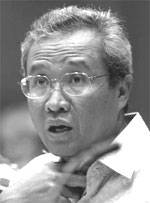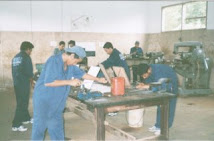Masyarakat Nuklir Indonesia
"Orang yang berani bangkit dan belajar dari kegagalan adalah
PEMENANG SEJATI!"
Indonesian Nuclear Society
The Indonesian Nuclear Society was launched in the mid-1960s,
(when first reactor in Indonesia launched [Triga Mark II at Bandung] a time of growing interest in employing peaceful applications of nuclear science and technology for bettering the lives of people in the Indonesian and around the world.
Visi
Pendukung dan Pengembang Program IPTEK Nuklir untuk Perdamaian di Indonesia
18 Reaktor Nuklir Indonesia tahun 2040
Tersedianya sarana pendamping disetiap reaktor
1. Pusat Pendidikan dan Latihan
2. Pusat Inovasi, Penelitian dan Pengembangan
Misi
1. Wahana Edukasi masyarakat mengenai IPTEK Nuklir
2. Sarana penampung aspirasi masyarakat mengenai IPTEK Nuklir
Program
1. Pertemuan Rutin Pertahun
2. Publikasi dan Edukasi Masyarakat
Fokus
5 Tahun Pertama
(2010-2015)
5 Tahun Kedua
(2015-2020)
5 Tahun Ketiga
(2020-2025)
5 Tahun Keempat
(2025-2030)
5 Tahun Kelima
(2030-2035)
5 Tahun Keenam
RI to build four nuclear power plants until 2025

(Prof. Kusmayanto Kadiman, M.Sc., Ph.D.)
"If one PLTN has a capacity to produce 1,200 MW, we will be needing four nuclear power plants by 2025 to meet domemstic need for electricty," the minster said during a visit to Sebelas Maret University (UNS) here.
A number of locations where the nuclear power plants could be set up had already been surveyed, including places in the northern parts of Java Island and in the southern parts of Kalimantan island, he said.
"Construction of nuclear power plants is already provided for in a law and included in the National Long-Term Development Plan (RPJPN) 2004-2025," he said.
Construction of the Muria PLTN in Jepara, Central Java, was expected to be finalised in 2016 and therefore work on the project had to begin in 2008, Kusmayanto said.
About the existence of popular resistance to the government plans to build nuclear power plants, the minister said people were free to express their opinion on the matter but the government`s plans could only be stopped if the law providing for the development of nuclear power was changed.
Meanwhile, the government would cotinue to prepare the technology, funding and human resources needed to build and operate neclear power plants, he said. (*)
Disusun Ulang Oleh:
Arip Nurahman
Pendidikan Fisika, FPMIPA Universitas Pendidikan Indonesia
&
Follower Open Course Ware at MIT-Harvard University, Cambridge. USA.











Tidak ada komentar:
Posting Komentar